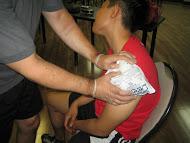
When it comes to treating a shoulder dislocation, one needs to know how to identify this type of injury and what first aid steps need to take in order to help a victim. The shoulders are very mobile joints, and hence they are susceptible to dislocations. This may be due to falls, a hard jolt to the shoulders or even overextending the arms, thus leading the shoulder to move out of its socket. People that engage in contact sports or activities that make extensive use of the shoulders often face this type of injury. For instance, it is common for basketball and football players as well as swimmers to incur shoulder dislocations.
Symptoms of a Dislocated Shoulder
Dislocated shoulders often happen in the case of one of the earlier mentioned scenarios. Often, victims will feel pain, numbness, or weakness on the affected shoulder. There will be pain if a shoulder blade that is out of its natural position happens to be pressing a nerve. Slight deformity on this part of the body might also be visible. This may be accompanied with swelling and bruises as well.
How to Help Shoulder Dislocation Victims
- Most shoulder dislocations can be corrected through a closed reduction. This simply means putting the joint back into place. A trained doctor or first aider can perform this first aid treatment. However, never attempt to align a dislocated shoulder if you are not trained how to do this. This could cause more damage to the victim, and you want to avoid causing a broken joint or forcing the shoulder further out of place while trying to correct the dislocation.
- If no one is around to help, take the victim to the doctor. A trained physician will know how to put the shoulder joint back to its socket. For severe injuries, the joints may require specialized care. An x-ray will show the extent of the damage if any. However, aligning a dislocated shoulder and applying some ice will help to reduce pain drastically.
When recovering from a dislocated shoulder, it is important to refrain from strenuous physical activity that may increase the chances of another dislocation. Keep in mind that continuing physical activity with a dislocated shoulder only increases the chances of damage to adjacent tissues, muscles and nerves.
Some people may experience dislocations on the shoulders quite often. Doctors may suggest corrective surgery to help patients from experiencing chronic dislocations. This helps to repair damaged ligaments around the shoulders, which keeps the joint in place when knocked violently or overstretched.
